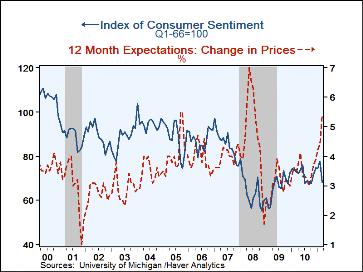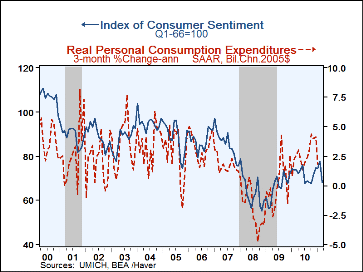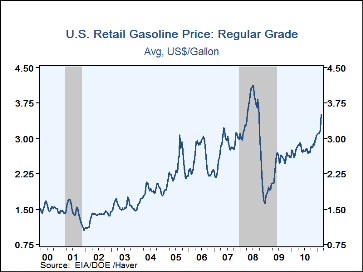 Global| Mar 14 2011
Global| Mar 14 2011U.S. Inflation And The Rational Consumer
by:Tom Moeller
|in:Economy in Brief
Summary
Consumers know a bad deal when they see one. They realize that when prices go up, purchasing power goes down. Data from the University of Michigan, contained in Haver's database, paint a compelling picture. The simple relationship, [...]
 Consumers know a bad deal when they see one. They realize that when prices go up, purchasing power goes down.
Data from the University of Michigan, contained in Haver's database, paint a compelling
picture. The simple relationship, shown in the accompanying chart, indicates a strong correlation between
consumers' twelve-month price inflation expectations and consumer sentiment, i.e., the sense of whether something
is good, bad, or insignificant. Therefore, the March surge in inflation expectations to
5.4%, fueled by higher gasoline prices, accompanied the 12.0% m/m
decline in sentiment, reported last week.
Consumers know a bad deal when they see one. They realize that when prices go up, purchasing power goes down.
Data from the University of Michigan, contained in Haver's database, paint a compelling
picture. The simple relationship, shown in the accompanying chart, indicates a strong correlation between
consumers' twelve-month price inflation expectations and consumer sentiment, i.e., the sense of whether something
is good, bad, or insignificant. Therefore, the March surge in inflation expectations to
5.4%, fueled by higher gasoline prices, accompanied the 12.0% m/m
decline in sentiment, reported last week.
The relationship does not end, of course, with what higher prices do directly to purchasing power. Other effects include its raising the likelihood of higher interest rates (see the early 1980s), lowering of the foreign exchange value of the dollar and the potential for spillover to foreign economies. So what do consumers tend to do in this environment? Often, they buy today before it's more expensive tomorrow. Or maybe they shift buying towards less expensive items. The hard truth is that when buying power is eroded, the consumer does less buying. And the scenario can play out quickly. That's because the index of consumer sentiment also has a strong correlation with the three-month change in real consumer spending.
| Inflation, Consumer Sentiment & Spending | Mar | Feb | Jan | Mar'10 | 2010 | 2009 | 2008 |
|---|---|---|---|---|---|---|---|
| Consumers' 12-mth. Price Inflation Expectations | 5.4 | 4.4 | 4.2 | 3.4 | 3.5 | 3.0 | 4.7 |
| Consumer Sentiment Index | 68.2 | 77.5 | 74.2 | 73.6 | 71.8 | 66.3 | 63.8 |
| Real Consumer Spending (3-mth. Chg.) | -- | -- | 1.8% | 0.8% | 1.8% | -1.2% | -0.3% |
Tom Moeller
AuthorMore in Author Profile »Prior to joining Haver Analytics in 2000, Mr. Moeller worked as the Economist at Chancellor Capital Management from 1985 to 1999. There, he developed comprehensive economic forecasts and interpreted economic data for equity and fixed income portfolio managers. Also at Chancellor, Mr. Moeller worked as an equity analyst and was responsible for researching and rating companies in the economically sensitive automobile and housing industries for investment in Chancellor’s equity portfolio. Prior to joining Chancellor, Mr. Moeller was an Economist at Citibank from 1979 to 1984. He also analyzed pricing behavior in the metals industry for the Council on Wage and Price Stability in Washington, D.C. In 1999, Mr. Moeller received the award for most accurate forecast from the Forecasters' Club of New York. From 1990 to 1992 he was President of the New York Association for Business Economists. Mr. Moeller earned an M.B.A. in Finance from Fordham University, where he graduated in 1987. He holds a Bachelor of Arts in Economics from George Washington University.
More Economy in Brief
 Global| Feb 05 2026
Global| Feb 05 2026Charts of the Week: Balanced Policy, Resilient Data and AI Narratives
by:Andrew Cates








